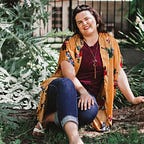On the Time I Really Felt For All the Men
When I wrote about three of my own personal intersections (white, female, Christian), “female” and “Christian” were incredibly easy for me to put on the page. The impact, the personal meaning, the burdens inherently attached. In a million small ways, my lived reality has pounded them into me.
[Image Description: Green rolling hills in the background. In the foreground, 4 men with dark hair sit with their backs to us. They are wearing a black shirt, red shirt, gray shirt, and white shirt. One is slightly turned and appears to be laughing.]
I know about being female, and I know about being Christian.
You’d have thought that whiteness would have been the same. After all, I’ve been white for as long as I’ve been female. Shouldn’t I know about that experience too?
But when I got to that part….
I got a little stuck.
What is there to say about it? My mind went pretty much blank. I had this sense of…. “I just am white.” Intellectually I can tell you stuff about it — facts and figures on the ways whiteness plays out systemically, what it means in the American social & historical realms, etc.
But I, Hannah Hassler, the white human?
The words just weren’t flowing. (Which obviously bothered me, because I think about and engage with content/conversation/humans on topics like white privilege frequently.)
So I went back and looked at the rest of what I had drafted, and I had an AHA moment —
If you’re female, there is a constant sense of being norm-referenced against men. Being female means something, partly because it means not being male, and it works its way into every part of your life. From which sports you get to play, to what jobs you're likely to get, to the expectations people have of you, to whether your professor will meet with you during office hours, to the salary you’re given, to how direct you can be before people don’t like you anymore….
Nothing seems to be untouched by gender.
And so being female is deeply felt and understood within my core.
And if you’re a Christian (in the way I lived it), there is a constant evaluation against “the world”. Unlike binary gender norms and race, Christianity is a choice, and someone can always start backsliding. So even though you might be in the “in” group today, you never know if you’ll have slipped into the “out” group tomorrow.
The constant watchfulness, wariness, evaluation, and judgment constantly centered the reality of how Christianity worked, how I needed to be as a Christian, and what it meant in my life.
And so being Christian was deeply felt and understood within my core.
When it comes to whiteness, especially being white in America, there isn’t the same sort of intense mirroring taking place.
I wrote this in my previous essay on my own identities:
Whiteness has been the most pervasive (and easiest to choose not to see) aspect of these three identities for me. Its saturation point is so high, I know that I’m a bit like the fish who has trouble understanding water.
And later followed it with this in my essay on norm referencing:
I am white, and in American society white is a norm-referenced point. It’s harder for me to see it because I am it. I don’t have a constant mirror being held up for me to reflect against….so unless I make an effort to really do so, it just doesn’t happen.
AND THEN —
I had my moment of feeling for the men.
You see, when I talk about the experience of being a woman in the world, I know the stats and figures and intellectual stuff….and I know the core, lived reality. (To clarify here: I do love being a woman.)
And honestly, I get pissed at men who clearly don’t “get” it. You can tell when they have that sort “Yeah…but.” mentality that makes it clear they haven’t internalized or processed much around their own maleness, which means they can’t contribute much to a conversation about either themselves or any other gender identity.
If they had to sit down and really write about what being a man meant to them, and how it impacted their day to day lives, I wonder what they would say. I wonder if they would draw a blank the way I did with whiteness.
Because maybe any position of privilege is hard to see, and moving beyond an intellectual assent of a few main points is not at all the same as feeling the core reality of living the non-privileged version of life, day after day.
And in the same way that men who haven’t done any work to consider their own, lived experience of being male can’t contribute much to a conversation on gender…
White people who haven’t done any work to consider their own lived experience of being white can’t contribute much to a conversation on race….
Agree, or disagree?
I would venture to guess that being straight, cis, and abled have a major “fishbowl” effect for a lot of society today, but I’d love to hear from you.
- What parts of your identity do you probably not recognize, interact with, or take into consideration very frequently?
- Would you say those tend to be identities imbued with high levels of power, or with systemic disempowerment?
With I Am Intersectionality, I hope to provide thought-provoking resources that will help us understand more about our own personal intersections, and what those intersections mean in the historical and social moment we are living in today. If you’d like to get an occasional email with articles and resources on intersectionality, sign up here!
